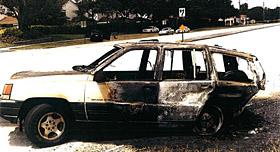 Chrysler said it would not conduct a safety recall to fix fuel leaks on its Jeep models after the National Highway Traffic Safety Administration requested that the company recall 2.7 million vehicles.
Chrysler said it would not conduct a safety recall to fix fuel leaks on its Jeep models after the National Highway Traffic Safety Administration requested that the company recall 2.7 million vehicles.NHTSA sent Chrysler a 13-page report Monday detailing why the automaker's fuel tank design on 1993-2004 Jeep Grand Cherokees and 2002-2007 Jeep Libertys was flawed, citing fire-related fatalities in these vehicles dating back to 1996.
"We believe NHTSA’s initial conclusions are based on an incomplete analysis of the underlying data, and we are committed to continue working with the agency to resolve this disagreement," the company said in a statement on Tuesday afternoon.
The photo above, provided by NHTSA, shows a Grand Cherokee after a fatal crash. Chrysler has until June 18 to respond formally, after which the federal agency could force the automaker to initiate a recall.
The models in question have been under investigation by NHTSA since September 2010, when the nonprofit Center for Auto Safety submitted a formal petition to the agency. (The Center for Auto Safety, founded by Ralph Nader and Consumers Union in 1970, was behind the effort of the infamous Ford Pinto explosion recall that corrected fuel tank failures from rear-end collisions.)
NHTSA said it had gathered police reports, federal crash data and registration information for these Jeep models and for eight competitors of the same model years, including the Isuzu Trooper and Chevrolet Blazer. The agency said it correlated the number of reported fatal fire-related crashes and fuel leaks with the number of registered vehicles from 1993 until now.
In total, 44 people died from 32 rear-end crashes that resulted in fires in 1993-2004 Grand Cherokee models, with seven fire-related fatalities from five rear-end crashes involving 2002-2007 Liberty models, the agency said. Twenty-seven fuel leaks in rear-end crashes that did not result in deaths were reported for both models.
The results show that the Jeep models "perform poorly when compared to their peer group" despite complying with federal safety standards for fuel tanks, the letter said. The agency said that the vehicles posed a higher risk of fires and leaks because Chrysler had installed the fuel tanks behind the rear axles, instead of on top of or in front of the axle, as is the norm for most new vehicles. In 2008, Chrysler relocated the Liberty's fuel tank ahead of the rear axle, the agency said.
"The design defect is the placement of the fuel tanks in the position behind the axle and how they were positioned, including their height above the roadway," NHTSA said.
Only the Suzuki Sidekick, which was produced in small numbers and was discontinued in 1998, scored worse. In total, Chrysler made about 4 million Libertys and Grand Cherokees between 1993 and 2007.
Chrysler said that its vehicles were safe and that the crash data were "similar to comparable vehicles produced and sold during the time in question."
"These vehicles met and exceeded all applicable requirements of the Federal Motor Vehicle Safety Standards, including FMVSS 301, pertaining to fuel-system integrity," the company said. "Our analysis shows the incidents, which are the focus of this request, occur less than once for every million years of vehicle operation."
Grand Cherokee, Liberty and other Jeep models have been stung by recalls over the past year.
In May, Chrysler recalled 469,027 2005-2010 Grand Cherokees and 2006-2010 Commanders that could inadvertently shift into neutral when the vehicle is started and cause the car to roll away.
In April, Chrysler recalled 30,000 Jeep Compass and Patriot SUVs from the 2012 and 2013 model years for fuel-tank transfer tubes that could starve the engine of gasoline.
In March and June of 2012, Chrysler recalled 347,000 Jeep Liberty SUVs from 2004-2007 for a rear lower control arm that could rust and fracture.
In November 2012, Chrysler recalled 744,822 Jeep Liberty and Grand Cherokee SUVs in the U.S. for airbags and seatbelt pre-tensioners that could inadvertently deploy or activate.
[Source: NHTSA, Chrysler]
Source: MSN
No comments:
Post a Comment